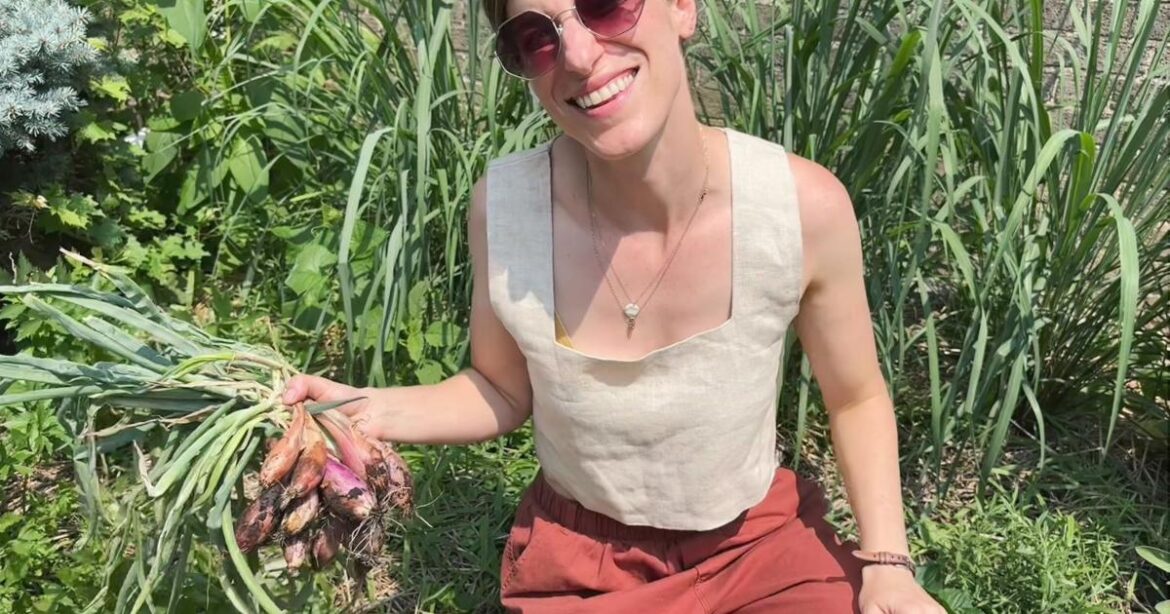Carly Sugar connects Detroit gardening and Jewish wisdom in Elul, showing how tending land nurtures the soul.
Chodesh Tov, and welcome to Elul.
This is an exciting month, both in the garden and in Jewish life. In our bioregion, it’s peak fruiting season: apples, stonefruit, brambles and grapes abound. Melons, beans, corn, squash, and tomatoes fill refrigerators, pantries, freezers and friends’ doorsteps. Their flavors and aromas awaken our senses, reminding us that harvest and preservation are urgent. When the last peach drops, will you have a pantry full of preserves, or will the moment have passed?
Elul calls us to awaken and prepare for the months ahead. I often return to Rabbi Alan Lew’s This is Real and You Are Completely Unprepared, which guides us from Tisha b’Av through Elul, the High Holidays and to Sukkot: “The journey I will describe in these pages is one of self-discovery, spiritual discipline, self-forgiveness and spiritual evolution … the journey from Tisha b’Av to Sukkot, from Rosh Hashanah to Yom Kippur, from birth to death and back to renewal again … Every one of us needs to move from anger to healing, from denial to consciousness, from boredom to renewal.”
Elul is the start of this journey — a time for reflection and closeness with the Divine, preparing us to hear the teru’ot of the shofar on Rosh Hashanah. For ancient Israelites, the shofar signaled sacred time, calling people to gather and pay attention, both physically and spiritually. This month, we are supposed to blow the shofar daily, waking us up, alerting us to the coming reckoning and readying us for teshuvah — our efforts of return and repair. What do we need to awaken to?
Teshuvah invites us to consider our relationships — not only with others but also with the land and its inhabitants. Where have we missed the mark, and what might repair look like?
Tending a garden reconnects us with the land. In a world where that relationship is often exploitative, careful cultivation can be an act of repair. Planting, tending and even harvesting can regenerate growth and biodiversity.
Robin Wall Kimmerer describes this beautifully in Braiding Sweetgrass, citing a study testing the indigenous principle that respectful harvesting promotes growth: “The surprise was that the failing plots were not the harvested ones, as predicted, but the unharvested controls. The sweetgrass that hadn’t been picked or disturbed in any way was choked with dead stems while the harvested plots were thriving.”
We see this in our own gardens. Harvesting greens, herbs, flowers and fruit triggers new growth: one cosmos stem becomes two; two becomes four. Arugula left alone bolts and becomes bitter; pests take over older leaves. The disturbance and potential stress of regular harvests, however, triggers more growth.
Plants and flowers multiply, providing more food and habitat for insects, birds and small mammals, yielding better health and diversity in our growing spaces.
This ecological wisdom mirrors Elul’s spiritual lessons. Examining our mistakes and seeking repair can be uncomfortable, even painful, but that discomfort is the path to growth. Guilt can motivate action, shame can hold us back, but our tradition offers support.
Elul itself is an acronym: “Ani L’dodi V’dodi Li, I am my beloved’s and my beloved is mine,” (Song of Songs 6:3.) This expresses this month’s particularly close and loving relationship with the Divine. We are not meant to fear G-d as distant, unapproachable or unforgiving. As Rabbi Schneur Zalman of Liadi, founder of Chabad Chassidus, said, during Elul, “the King is in the field,” ready to meet us wherever we are.
Seize this moment — harvest what is ready. Taste the fruits of your labor, knowing each one carries the promise of more to come. Let your garden be a sanctuary of reflection, where the work of your hands nourishes both body and soul. As you recall ways you have been wronged or have yourself missed the mark, let forgiveness and amends be your pruning shears — removing what is spent, opening space for new growth and abundance. With the Divine alongside you, lovingly present in the field, your spirit is prepared, and your heart resourced, ready to continue the journey ahead.
Carly Sugar’s work explores the intersection of food skills, community-building, and place-based education, driven by the city of Detroit’s food sovereignty movement, and Jewish wisdom. As owner-operator of Chamomile Gardens, Carly brings garden visions to life throughout Metro Detroit for individuals, families, businesses and organizations seeking to grow food and flowers in their space. Learn more at chamomilegardens.com. Gardening questions you want to see answered here? Send them to Carly at growchamomile@gmail.com.




Comments are closed.